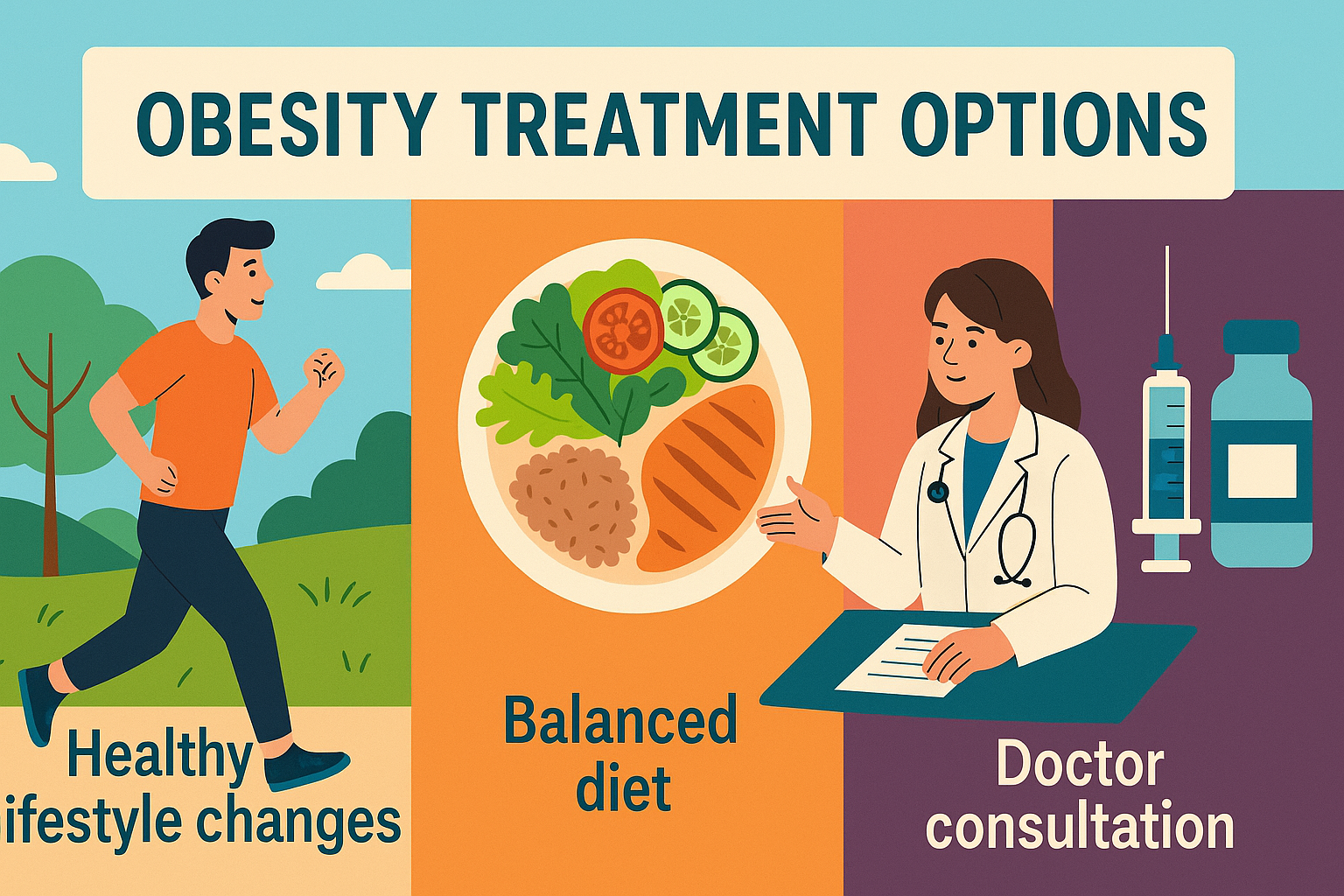Obesity is a complex, chronic condition linked to serious health risks like diabetes, heart disease, and certain cancers. Fortunately, advancements in medicine and lifestyle science offer multiple evidence-based treatment options. Below, we explore 8 proven strategies to manage obesity, tailored to individual needs and health goals.
1. Lifestyle Modifications
The Foundation of Weight Management
- What it involves: Sustainable changes to daily habits, such as prioritizing sleep, reducing stress, and avoiding sedentary behaviors.
- Why it works: Small, consistent changes create long-term success.
- Example: Standing desks, walking breaks, and setting regular meal times.
2. Dietary Changes
Fueling Your Body Mindfully
- Key approaches:
- Balanced diets: Mediterranean, DASH, or plant-based diets.
- Portion control: Using smaller plates or tracking food intake.
- Reducing processed foods: Limiting added sugars and refined carbs.
- Pro tip: Pair with mindful eating (learn more here) to avoid emotional overeating.
3. Physical Activity
Move More, Sit Less
- Recommendations:
- 150+ minutes/week of moderate exercise (e.g., brisk walking, cycling).
- Strength training 2–3 times/week to preserve muscle mass.
- Bonus: Exercise improves metabolism, mood, and insulin sensitivity.
4. Behavioral Therapy
Rewiring Habits and Thoughts
- How it helps: Addresses emotional eating, stress triggers, and self-sabotaging patterns.
- Methods: Cognitive Behavioral Therapy (CBT), counseling, or support groups.
- Ideal for: Those struggling with yo-yo dieting or food addiction.
5. Prescription Medications
When Lifestyle Changes Aren’t Enough
- How they work: Suppress appetite, reduce cravings, or block fat absorption.
- Common options:
- GLP-1 receptor agonists: Semaglutide (Wegovy), liraglutide (Saxenda) – promote satiety and blood sugar control.
- Other FDA-approved drugs: Orlistat, phentermine-topiramate, bupropion-naltrexone.
- Who qualifies: Adults with BMI ≥30 or ≥27 with obesity-related conditions (e.g., hypertension).
6. Bariatric Surgery
For Severe Obesity
- Types: Gastric bypass, sleeve gastrectomy, gastric banding.
- How it works: Reduces stomach size or alters digestion to limit calorie intake.
- Eligibility: BMI ≥40 or ≥35 with comorbidities (e.g., type 2 diabetes).
- Success rate: Patients often lose 20–35% of body weight long-term.
7. Medical Devices
Non-Surgical Tools
- Options:
- Gastric balloons: Temporarily placed in the stomach to promote fullness.
- Vagal nerve blockers: Devices that disrupt hunger signals.
- Aspiration therapy: Removes a portion of meals via a tube.
- Pros: Less invasive than surgery; reversible.
8. Emerging Therapies
The Future of Obesity Treatment
- GLP-1/GIP dual agonists: Tirzepatide (Zepbound) – outperforms many existing drugs.
- Gene therapy: Targeting genetic factors linked to obesity (experimental).
- Microbiome treatments: Probiotics to balance gut bacteria.
Which Treatment is Right for You?
Obesity management is not one-size-fits-all. Factors like BMI, health conditions, and personal preferences determine the best approach. Always consult a healthcare provider to:
- Evaluate risks and benefits.
- Combine therapies (e.g., medication + diet).
- Monitor progress and adjust plans.
FAQs
Q: Can obesity be cured?
A: It’s a chronic condition, but remission is possible with sustained effort.
Q: Are weight-loss medications safe long-term?
A: Most are approved for extended use, but regular monitoring is essential.
Q: Is surgery risky?
A: Complications exist, but modern techniques have improved safety.
Final Thoughts
Obesity is treatable, and help is available. Whether through lifestyle tweaks, medication, or surgery, the goal is better health—not just weight loss. Start by discussing options with a doctor, and remember: progress > perfection.
Disclaimer:
The information provided is for educational purposes only and not a substitute for professional medical advice. Always consult your healthcare provider before starting any treatment. Individual results may vary based on health status and adherence to prescribed therapies.
(For informational use only. Not a medical recommendation.)
References & Resources
- CDC: Adult Obesity Facts
U.S. statistics, health risks, and prevention strategies. - NIH: Obesity Management Guidelines
Evidence-based recommendations for treating obesity. - American Society for Metabolic and Bariatric Surgery (ASMBS)
Information on bariatric surgery options, risks, and outcomes. - FDA: Weight-Loss Medications
Details on FDA-approved drugs like Wegovy, Zepbound, and Saxenda. - Mayo Clinic: Bariatric Surgery
Overview of surgical procedures, recovery, and results. - World Health Organization (WHO): Obesity
Global data and policies for obesity prevention. - National Institute of Diabetes and Digestive and Kidney Diseases (NIDDK)
Tips on mindful eating and behavioral strategies. - ClinicalTrials.gov
Search for ongoing obesity treatment trials and emerging therapies.
Note: Links open in a new tab. Always consult a healthcare provider before starting any treatment.



